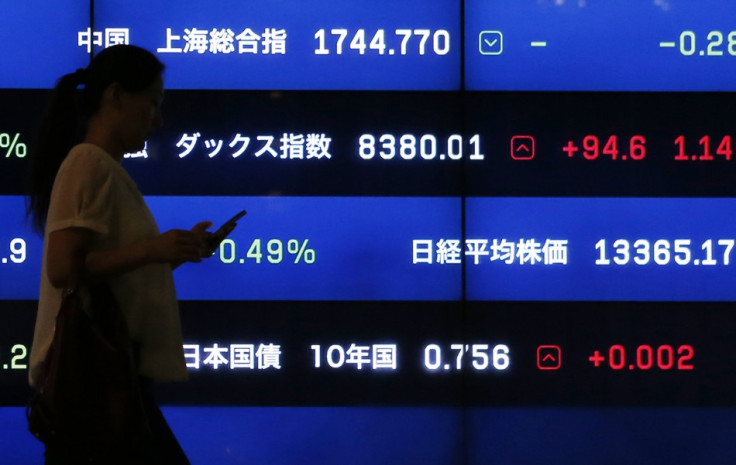Asian Markets Weekly Review: Australia's ASX Outshines Regional Indices

Most stock markets across Asia finished the week higher. Australia's S&P/ASX led the pack while South Korea's Kospi trailed.
Markets were choppy at the beginning of the week as downbeat trade balance data from Japan and concerns surrounding the future pace of US stimulus weighed on investor sentiment.
Data from Japan showed that exports shot up 12.2% in the year to July, their highest increase in about three years. However, the country's trade balance remained in deficit.
A weaker Japanese yen and rising oil prices have inflated Japan's import bill. Most nuclear power generating stations have not resumed operations following the March 2011 Fukushima nuclear disaster. In turn, this increased Japan's dependence on imported oil.
The markets opened lower on 20 August, and followed a downbeat handover from Wall Street. Market participants awaited the minutes from the US Federal Reserve's July policy meeting for hints about the timing of the planned reduction of monetary stimulus.
The Fed's $85bn a month bond-buying programme has stimulated the US economy and the markets the world over for a while now. The markets saw mixed trading on 21 August, ahead of the release of the minutes of the Fed's July policy meeting.
In company news, Japanese firm Tokyo Electric Power's (Tepco) stock finished 9.28% lower at 557 yen (£4.2, €4.9) in Tokyo that day.
The utility announced the previous day that about 300 metric tonnes (660,000 pounds) of highly radioactive water had leaked from a storage tank at its crippled Fukushima nuclear power plant. This adds to the contaminated water leaks reported in recent weeks.
The markets reversed early losses on 22 August on news that China's manufacturing sector was improving. However, upbeat Chinese data failed to undo the damage triggered by fears that the US Federal Reserve was on track to trim its asset buys later this year.
China's manufacturing sector experienced strong recovery in August with improved output and new orders, a positive sign that the world's second-largest economy is picking up pace after two quarters of slowdown. The HSBC flash China manufacturing purchasing managers' index (PMI) rose to a four-month high at 50.1 in August from 47.7 in July. That was well ahead of the economists' estimated reading of 48.3.
"China's manufacturing growth has started to stabilize on the back of modest improvements of new business and output. This is mainly driven by the initial filtering-through of recent fine-tuning measures and companies' restocking activities," said HSBC's chief China economist Hongbin Qu.
Positive Chinese data could not calm frayed nerves. Markets suffered early losses as the minutes of the US central bank's July meeting, released overnight, suggested the Fed could trim its massive monthly bond-buying programme as early as September.
"The Fed certainly seems to have mastered the art of keeping the market guessing ... The only way forward is to continue closely watching US economic data for clues on how soon we can expect tapering to start," said IG Markets strategist Stan Shamu.
The Fed's FOMC is due to meet on 17 September, 29 October and 17 December. The September and December meetings will be followed by a news conference led by Fed Chairman Ben Bernanke.
"The FOMC meeting in September could be the catalyst behind a possible resumption of the long-term uptrend/bull market or the start of a new longer-term downtrend," said Tim Radford, global analyst at Rivkin Securities.
In other news, China's stock markets regulator said it would examine stock trading software in use across the country's brokerages. Last week, a suspected technological glitch at one firm triggered erroneous trades worth a few billion dollars.
The China Securities Regulatory Commission's (CSRC) investigation extends to over 110 brokerages. Everbright Securities, the Shanghai-based firm at the centre of the probe, its custom-built trading platform and the firm that built the platform Shanghai Mercrtsoft Technology are already under scrutiny.
On 16 August, a two-minute trading glitch at Everbright set off some 26,000 erroneous buy orders to the Shanghai Stock Exchange (SSE). The trades, worth 23.4bn yuan (£2.45bn, €2.86bn, $3.82bn), fuelled a rally on the SSE.
Most markets logged gains on 23 August and the Japanese Nikkei led the pack after Thursday's data showed manufacturing activity in the US, Europe and in China was improving, though not all of them saw rises.
Data firm Markit showed that the preliminary US manufacturing Purchasing Managers Index (PMI) rose to 53.9 in August from 53.7 in July. The August reading is slightly lower than economists' forecast of 54.0.
Earlier, data showed that the Eurozone's private sector expanded at its fastest pace in more than two years in August, adding to hopes that the single-currency region has gained momentum after experiencing nominal growth in the second quarter. The Markit flash eurozone composite output index rose to a 26-month high at 51.7, up from 50.5 in July. Economists expected an index reading of 50.9 for the month.
Market Movements
Australia's S&P/ASX 200 finished 0.47% higher at 5,123.40.
The Shanghai Composite index finished 0.10% higher at 2,057.46.
The Japanese Nikkei index ended 0.01% higher at 13,660.55.
Hong Kong's Hang Seng ended 2.41% lower at 21,863.51.
South Korea's Kospi finished 2.51% lower at 1,870.16.
The Week Ahead
The week ahead will see Japan put out inflation data for the month of July, alongside preliminary industrial production data for the same month.
The government will release securities investment data, which will throw light on the net sales and net purchases of foreign securities by residents.
Japan will also release housing starts data for the month of July.
India will put out fiscal deficit data for the month of July.
The Australian government publish private sector capital expenditure data for the second quarter, which measures present and future expenditure intentions.
Australia will also put out private-sector borrowings data for the month of July.
New Zealand will release its trade balance data for the month of June.
© Copyright IBTimes 2025. All rights reserved.






















